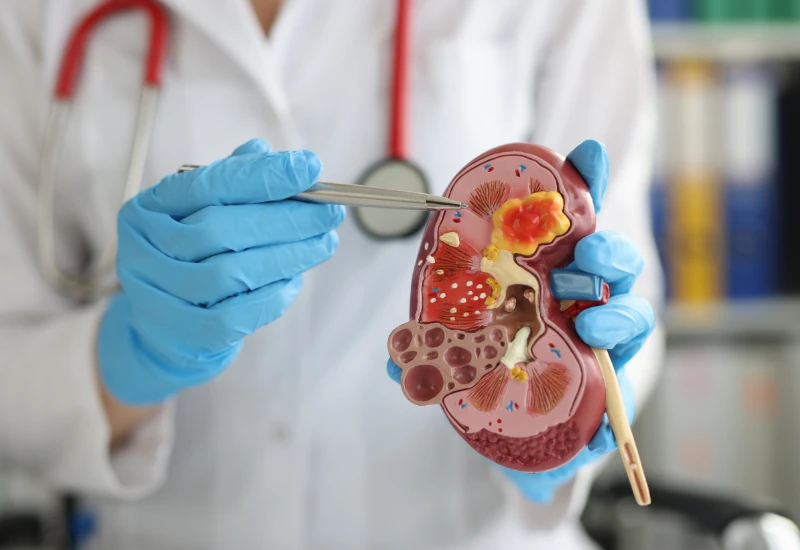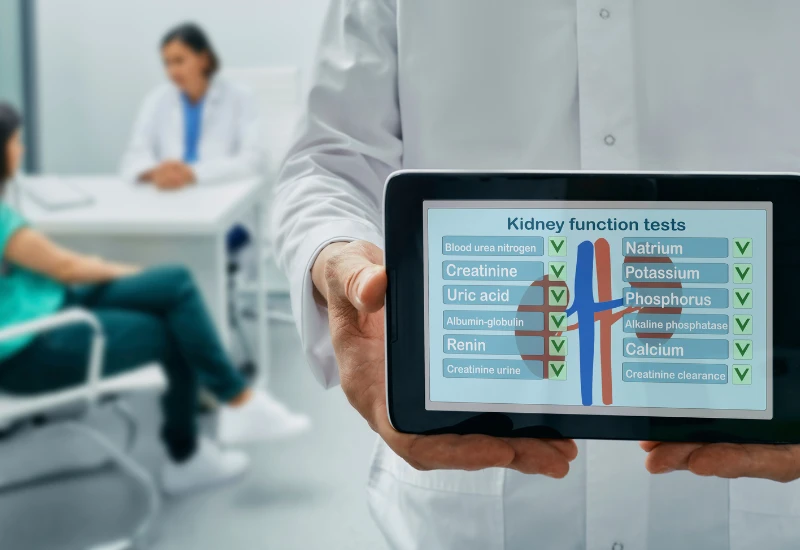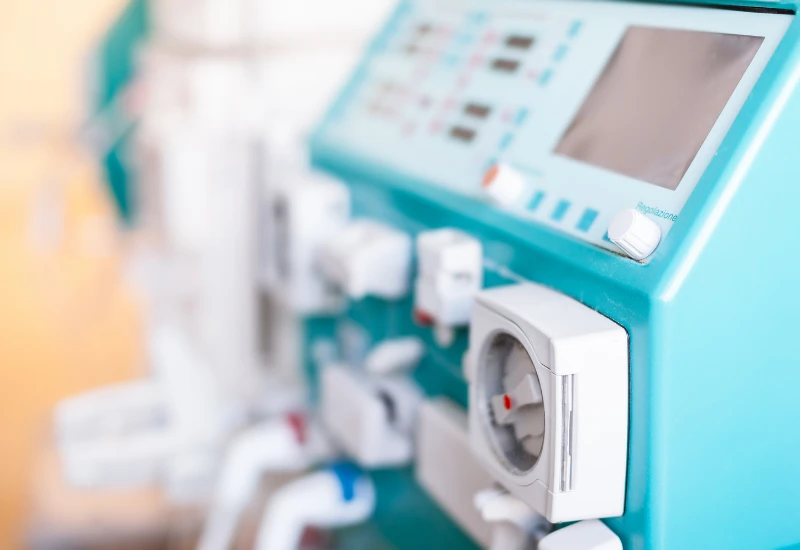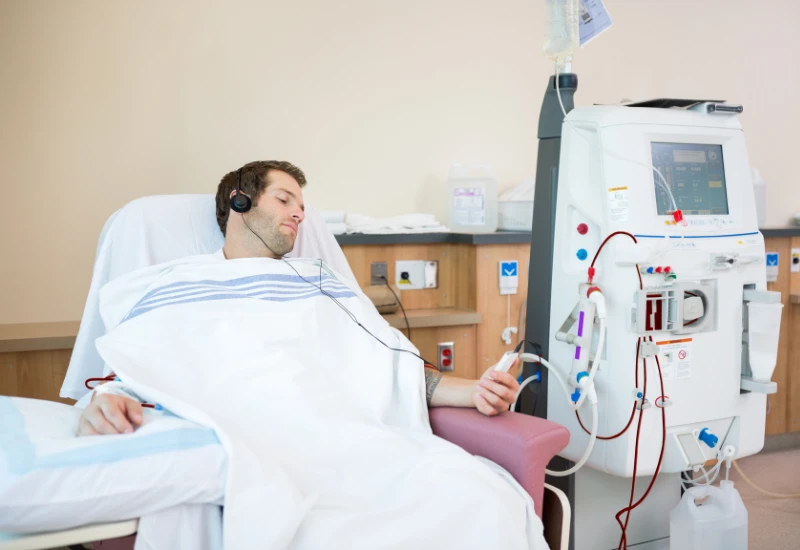Chronic Kidney Disease Treatment by Stem Cells at IRM Hospital
IRM Hospital is not just a treatment center but also a hub for research and innovation in regenerative medicine. The hospital collaborates with international research institutions to study stem cell applications in CKD and other renal diseases. This commitment to research ensures that patients at IRM Hospital have access to the most advanced and effective treatments available.
Chronic kidney disease, also called chronic kidney failure, describes the gradual loss of kidney function. The kidneys filter wastes and excess fluids from the blood, which are then excreted in your urine. When chronic kidney disease reaches an advanced stage, dangerous levels of fluid, electrolytes and wastes can build up in the body. In the early stages of chronic kidney disease, you may have few signs or symptoms. Chronic kidney disease may not become apparent until your kidney function is significantly impaired.


Research and Innovations
At the core of IRM Hospital’s emergency services is the ethos of providing timely and effective medical intervention. The hospital’s emergency room (ER) is staffed by a team of highly skilled emergency physicians, trauma surgeons, and critical care nurses, all dedicated to stabilizing and treating patients in critical conditions. The use of advanced resuscitation equipment and life support systems further ensures that patients receive the best possible care during their most vulnerable moments.

Patient Support and Education
Recognizing the complexities of CKD and stem cell therapy, IRM Hospital provides comprehensive support and education to patients and their families. This includes counseling services, informational seminars, and support groups designed to help patients navigate their treatment journey.

The Future of CKD Treatment
The use of stem cells in treating chronic kidney disease represents a significant advancement in medical science. As research continues to evolve, the potential for stem cell therapy to offer a viable alternative to traditional CKD treatments grows. IRM Hospital in Islamabad remains at the forefront of this exciting field, offering hope to CKD patients through innovative treatment options and a commitment to advancing medical research.
The Treatment
Process
The process of stem cell therapy for CKD at IRM Hospital involves several key steps. Initially, patients undergo a comprehensive evaluation to determine their eligibility for stem cell therapy. This includes a detailed assessment of their kidney function, the extent of kidney damage, and overall health status. Once deemed a suitable candidate, the stem cell transplantation procedure is carefully planned.For autologous stem cell therapy, stem cells are harvested from the patient's bone marrow or adipose tissue, processed, and then re-injected into the body, targeting the kidneys. In cases of allogeneic therapy, stem cells are sourced from a compatible donor. Following transplantation, patients are closely monitored to assess the therapy's effectiveness and any improvements in kidney function.
Precision & Advancement in Modern Treatments
medical emergency services at IRM
Hospital, Islamabad, reflect a deep-seated commitment to saving lives and providing the highest level of care in moments of crisis.
Stem Cell Therapy at IRM Hospital, Islamabad
IRM Hospital, a leading medical facility in Islamabad, has embraced stem cell technology to treat CKD. The hospital’s regenerative medicine program focuses on using mesenchymal stem cells (MSCs), which are known for their ability to reduce inflammation, mitigate fibrosis, and promote tissue repair. These cells can be derived from the patient (autologous) or a donor (allogeneic), depending on the treatment plan and the patient’s condition.
Chronic Kidney Disease (CKD) is a multifaceted condition that necessitates a comprehensive and personalized approach to treatment. Beyond the pioneering stem cell therapies, IRM Hospital in Islamabad employs a range of innovative and supportive treatment options designed to address the various stages and complications of CKD. This integrated approach not only aims at slowing the progression of the disease but also at enhancing the quality of life for patients.
Stem cell therapy is highly anti-inflammatory, reducing levels of chronic inflammation within the body to levels that allow healing to occur when it was otherwise inhibited. In terms of Kidney Disease, the levels of inflammation would be high throughout the body. By lowering inflammation markers to normal levels, the body can begin to regenerate the tissue required for normal function.
Additionally, stem cells have already been used in conjunction with organ transplants to eliminate the need for a lifetime of immunosuppressant drugs.
Dialysis: A Lifeline for Many
Dialysis remains a cornerstone in the management of advanced CKD and end-stage renal disease (ESRD). IRM Hospital provides both hemodialysis and peritoneal dialysis options:
- Hemodialysis filters the blood through a machine outside the body, removing waste products and excess fluids. It typically requires visits to the hospital three times a week.
- Peritoneal Dialysis involves using the lining of the abdomen to filter blood inside the body, offering more flexibility and independence for the patient.
Kidney Transplantation: A New Lease on Life
For suitable candidates, kidney transplantation offers a more permanent solution compared to dialysis. This procedure involves replacing the diseased kidney with a healthy one from a compatible donor.
IRM Hospital’s transplant unit works closely with patients to manage the pre-transplant evaluation, surgical procedure, and post-transplant care, including immunosuppressive therapy to prevent organ rejection.
Pharmacological Management: Controlling Symptoms and Slowing Progression
Effective pharmacological treatments are vital in managing CKD’s progression and its symptoms. IRM Hospital’s nephrologists prescribe a range of medications tailored to each patient’s condition, including:
- Blood pressure medications to prevent further kidney damage.
- Diuretics to help remove excess fluid and control blood pressure.
- Erythropoietin to treat anemia associated with CKD.
- Phosphate binders to prevent phosphorus buildup in the blood.
Lifestyle Modifications and Nutritional Counseling
Understanding the importance of diet and lifestyle in managing CKD, IRM Hospital offers nutritional counseling and lifestyle modification programs. These are designed to help patients manage their condition through healthy eating, weight control, and smoking cessation. The hospital's dietitians work closely with patients to develop personalized nutrition plans that limit certain nutrients.
Supportive Care: Addressing the Whole Patient
IRM Hospital recognizes that CKD affects more than just physical health. The hospital provides supportive care services, including psychological counseling, to help patients and their families cope with the emotional and mental health challenges associated with chronic illness. Support groups and educational workshops are also available to provide further assistance and information.
Innovative Research and Clinical Trials
IRM Hospital is committed to advancing CKD treatment through ongoing research and participation in clinical trials. Patients have access to the latest therapeutic options being studied, including novel drug therapies and interventions designed to improve kidney function and delay the need for dialysis or transplantation.
The most common signs and symptoms of chronic kidney disease include:
● anemia
● blood in urine
● dark urine
● decreased mental alertness
● decreased urine output
● edema – swollen feet, hands, and ankles (face if edema is severe)
● fatigue (tiredness)
● hypertension (high blood pressure)
Chronic Kidney Disease poses a daunting challenge, but the advent of stem cell therapy heralds a new era in treatment possibilities. IRM Hospital in Islamabad is leading the way in this revolutionary approach, offering patients not just treatment, but a chance at a renewed quality of life. Through ongoing research and a patient-centered approach to care, IRM Hospital is setting new standards in CKD treatment, making what once seemed an insurmountable challenge a surmountable one.




